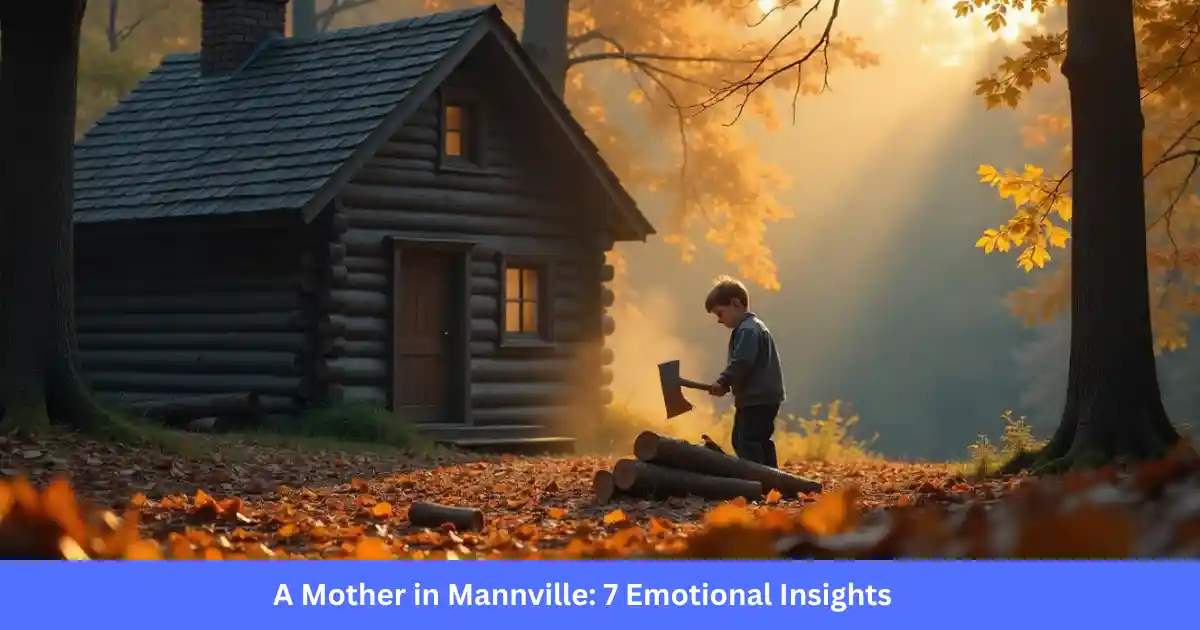“A Mother in Mannville” is one of Marjorie Kinnan Rawlings’ most emotionally powerful short stories, set in the quiet Carolina mountains. The story explores loneliness, integrity, human attachment, and the pain of broken expectations through the relationship between the narrator and a young orphan named Jerry. With simple storytelling and deep emotional layers, Rawlings shows how human connections can form unexpectedly—and how truth, innocence, and imagination can shape the heart of a child.

This article gives a full summary, Bangla explanation, themes, character sketch, literary devices, moral lessons, and questions for academic use.
Best English Suggestion for HSC 2026
A Mother in Mannville: Important Words & Bangla Meanings
- Orphanage – অনাথাশ্রম
- Isolation – একাকিত্ব
- Subtropics – উপউষ্ণ অঞ্চল
- Undersized – ছোট গড়নের
- Rhythmic – ছন্দোবদ্ধ
- Integrity – সততা, চরিত্রের দৃঢ়তা
- Carelessness – অসাবধানতা
- Subterfuge – প্রতারণা, ফাঁকি
- Gracious – মহানুভব
- Instinctive – স্বভাবজাত
- Treacherously – বিপজ্জনকভাবে
- Laurel – লরেল গাছ
- Affection – স্নেহ
- Distress – মানসিক কষ্ট
- Resentment – ক্ষোভ
- Parturition – প্রসব
- Poverty – দারিদ্র্য
- Duplicate – নকল/পুনরায় তৈরি করা
- Spinster – অবিবাহিত বৃদ্ধা মহিলা
- Integrity – সততার দৃঢ়তা
A Mother in Mannville: Paragraph-wise Bangla Explanation
Paragraph 1–2
বর্ণনাকারী লেখালেখির জন্য শান্ত পরিবেশ খুঁজতে পাহাড়ের ওপরে একটি অনাথাশ্রমের কেবিন ভাড়া নেন। সেখানে কাঠ কাটার জন্য একজন ছেলে পাঠানো হয়। ছেলেটি বারো বছরের মতো, দুর্বল গড়নের, ছেঁড়া জামা পরে, খালি পায়ে থাকে।
Paragraph 3
বর্ণনাকারী অবাক হন যে এত ছোট ছেলে এত দক্ষভাবে কাঠ কাটতে পারে। Jerry প্রমাণ করে তার বয়স ছোট হলেও তার দক্ষতা ও পরিশ্রম একজন প্রাপ্তবয়স্ক মানুষের মতো।
Paragraph 4–6
Jerry প্রতিদিন আসে—ভোরে, স্কুলের পরে—নীরবে নিজের দায়িত্ব পালন করে। তার চরিত্রে আশ্চর্য সততা (integrity) আছে। সে নিজের ভুলের দায় নিজেই নেয়, উদারতা দেখায়, এবং অন্যের সুবিধার জন্য বাড়তি কাজ করে।
Paragraph 7–8
Jerry’র মধ্যে এক ধরনের মহানুভবতা আছে—যেমন বৃষ্টির দিনে যাতে আগুন ধরাতে সমস্যা না হয়, এজন্য সে নিজে থেকে kindling গুছিয়ে রাখে। সে কোনো উপহার পেলে কৃতজ্ঞতা চোখে প্রকাশ করে।
Paragraph 9–12
Jerry বর্ণনাকারীর কুকুর Pat-এর সাথে গভীর সম্পর্ক গড়ে তোলে। যখন লেখিকা বাইরে যান, Jerry নিজের খাবার থেকে কুকুরকে খাওয়ায়। এটি তার মানবিকতার গভীরত্ব দেখায়।
Paragraph 13–14
একদিন Jerry বলে—বর্ণনাকারী তাকে তার মায়ের মতো লাগে। এরপর জানায়—তার মা Mannville-এ থাকে। লেখিকা বিশ্বাস করেন জেরির মা আছে এবং সে প্রতি গ্রীষ্মে তাকে দেখে।
Paragraph 15–17
Jerry মায়ের জন্য সাদা গ্লাভস কিনতে চায়। লেখিকা তার প্রতি গভীর আবেগান্বিত হন—দারিদ্র্যের মধ্যেও একটি শিশু তার মাকে উপহার দিতে চায়।
Paragraph 18–21
লেখিকা চলে যাওয়ার আগে Jerry-কে বিদায় জানাতে চান, কিন্তু Jerry আসে না। অনাথাশ্রমে জিজ্ঞেস করলে Miss Clark জানান—Jerry-র কোনো মা নেই এবং তার কখনও স্কেটসও ছিল না।
এতে বোঝা যায়—Jerry তার মায়ের গল্প বানিয়ে বলেছিল, হয়তো একাকিত্ব থেকে বা মমতার অভাব পূরণের চেষ্টায়।
ফলে গল্পটি এক গভীর বেদনার জায়গায় এসে শেষ হয়।
A Mother in Mannville: About the author
Marjorie Kinnan Rawlings was born on August 8, 1896, in Washington, D.C. A writer from an early age, she won a prize of $2 for a short story published in the Washington Post in 1907. She attended the University of Wisconsin where she received her Bachelor of Arts degree in English. She married Charles Rawlings, also a writer. The couple moved to New York, where they worked as journalists for various newspapers.
In 1933, the couple divorced. In 1941, she married Norton Baskin, a hotel owner from St. Augustine, Florida, and lived with him until her death in 1953. Rawlings was considered a writer of local or regional literature which focuses on a particular geographical setting of rural, Southern USA. Although her stories are based on the seemingly simple lives of rural people, her themes are universal.
Rawlings continued to write until her death from a cerebral hemorrhage on December 14, 1953.

Best SSC English Sugestion for SSC 2026
A Mother in Mannville: The passage
The orphanage is high in the Carolina mountains. I was there in the autoran. I wanted quiet, isolation, to do some troublesome writing. I wanted mountain air to blow out the malaria from too long a time in the subtropics. I was homesick too, for the flaming of maples in October, and for com shocks and pumpkins and black-walnut trees…. I found them all living in a cabin that belonged to the orphanage, half a mile beyond the orphanage farm. When I took the cabin, I asked for a boy or man to come and chop wood for the fireplace….
I looked up from my typewriter one late afternoon, a little startled. A boy stood at the door and my pointer dog, my companion, was at his side and had not barked to warn me. The boy was probably twelve years old, but undersized. He wore overalls and a torn shirt, and was barefooted.
He said, “I can chop some wood today.”
…. You? But you’re small.”
“Size don’t matter, chopping wood.” he said. “Some of the big boys don’t chop good. I’ve been chopping wood at the orphanage a long time.”
“Very well. There’s the axe. Go ahead and see what you can do.”
I went back to work, closing the door….
He began to chop. The blows were rhythmic and steady, and shortly I had forgotten him, the sound no more of an interruption than a consistent rain. I suppose an hour and a half passed and I heard the boy’s steps on the cabin stoop…. The boy said, “I have to go to supper now,” he said. “I can come again tomorrow.”
I said. “I’ll pay you now for what you’ve done,” thinking I should probably have to insist on an older boy….
We went together back of the cabin. An astonishing amount of solid wood had been cut…. “But you’ve done as much as a man.” I said. “This is a splendid pile.”
I looked at him, actually, for the first time. His hair was the color of the corn shocks and his eyes, very direct, were like the mountain sky when rain is pending gray, with a shadowing of that miraculous blue…. I gave him a quarter.
“You may come tomorrow afternoon,” I said, “and thank you very much.” He looked at me, and at the coin, and seemed to want to speak, but could not, and turned away….
At daylight I was half wakened by the sound of chopping. Again, it was so even in texture that I went back to sleep. When I left my bed in the cool morning, the boy had come and gone, and a stack of kindling was neat against the cabin wall. He came after school in the afternoon and worked until time to return to the orphanage. His name was Jerry…. he had been at the orphanage since he was four.
I could picture him at four. with the same grave gray-blue eyes and the same-independence? No, the word that comes to me is “integrity”…. It is bedded on courage, but it is more than brave. It is honest, but it is more than honesty. The axe handle broke one day. Jerry said the woodshop at the orphanage would repair it. I brought money to pay for the job and he refused it.
“I’ll pay for it,” he said. “I broke it. I brought the axe down careless.”
“But no one hits accurately every time,” I told him. “The fault was in the wood of the handle. I’ll see the man from whom I bought it”
It was only then that he would wake the money. He was standing book of his own carelessness. He was a free-will agent and he chose to do careful work, and if he bailed, he took the responsibility without subterfuge.
And he did for the unnecessary thing, the gracious thing, that we find done only by the great of heat Things no training can teach, for they are done on the instant, with to predicated experience. He found a cubbyhole beside the fireplace that I had not noticed. There, of his own accord, he put kindling and “medium” wood, so that I might always have dry fire material ready in case of sudden wet weather. A stone was loose in the rough wall to the cabin.
He dug a deeper hole and steadied it, although he came, himself by a shortcut over the bank. I found that when I tried to return his thoughtfulness with such things as candy and apples, he was wordless. “Thank you” was, perhaps, an expression for which he had had no use, for his courtesy was instinctive. He only looked at the gift and at me, and a curtain lifted, so that I saw deep into the clear well of his eyes, and gratitude was them, and affection, so over the firm granite of his character………..
He became intime, of course with my pointer, Pat. There is a strange communication between a boy and dog. Perhaps they possess the same singleness of spirit, the same kind of wisdom, it is difficult to explain, but it exists. When I went across the state for a weekend, I left the dog in Jerry’s charge… My return was belated and fog filled the mountain passes so treacherously that…… it was Monday noon before I reached the cabin. The dog had been fed and cared for that morning. Jerry came early in the afternoon, anxious.
“The superintendent said nobody would drive in the fog,” he said. “I came… last night and you hadn’t come. So brought Pat some of my breakfast this morning. I wouldn’t have let anything happen to him.”
…I gave him a dollar in payment, and he looked at it and went away. But that night he came in the darkness and knocked at the door.
“Come in, Jerry” I said, “If you’re allowed to be away this late.”
“I told may be a story” he said, “I told them I thought you would want to see me.” “That’s true.” I assured him, and I saw his relief. “I want to hear about how you managed with the dog”
He sat by the fire with me… and told me of their two days together. The dog lay close to him and found a comfort there that I did not have for him…… “He stayed right with me,” he told me, “Except when he ran in the laurel……. There was a place where the grass was high and I lay down in it and hid. I could hear Pat hunting for me… When he found me, he acted crazy, and he ran around and around me, in circles”
We watched the flames
“That’s an apple log,” he said. “It burns the prettiest of any wood.” We were very close.
He was suddenly impelled to speak
“You look a little bit like my mother,” he said. “Especially in the dark, by the fire.”
“That you were only four, Jerry, when you came here. “You have remembered how she looked, all these years?”
“My mother lives in Mannville,” he said
For a moment, finding that he had a mother shocked me…1 did not know why it disturbed me. Then I understood my distress. I was filled with a passionate resentment that any woman should go away and leave her son…… A son like this one – The orphanage was a wholesome place, the food was more than adequate, the boys were healthy…… Granted, perhaps, that the boy felt no lack, what blood fed the bowels of a woman who did not yearn ever this child’s lean body that had come in parturition out of her own!
“Have you seen her, Jerry- lately?” I asked. “I see her every summer. She sends for me”
I wanted to cry out. “Why are you not with her? How can she let you go away again?”
He said, “She comes up here from Manville whenever she can. She doesn’t have a job now.”
His face shone in the firelight
“She wanted to give me a puppy, but they can’t let anyone boy keep a puppy. You remember the suit had on last Sunday?” He was plainly proud. “She sent me that for Christmas. The Christmas before that”- he drew a long breath, savoring the memory- “she sent me a pair of skates…. I let the other boys use them, but they’re careful of them”
What circumstance other than poverty-?
“I’m going to take the dollar you gave me for taking care of Pat” he said, “and buy her a pair of gloves.”
…I hated her. Poverty or not, there was other food that bread, and the soul could starve as quickly as the body. He was taking his dollar to buy gloves for her big, stupid lands and she lived away from him, in Mannville, and contented herself with sending him skates.
“She likes white gloves,” he said. “Do you think I can get them for a dollar?” “I think so,” I said.
And after my first fury at her – we did not speak of her again, his having a mother, any sort at all, relieved me of the ache I had had about him…. He was not lonely. It was none of my concern.
He came every day and cut my wood and did small helpful favors and stayed to talk. The days had become cold, and often I let him come inside the cabin. He would lie on the floor in front of the fire, with one arm across the pointer, and they would both doze and wait quietly for me. Other days they ran with a common ecstasy through the laurel, and he brought me back vermilion maple leaves, and chestnut boughs dripping with imperial yellow. I was ready to go.
I said to him, “You have been my friend, Jerry. I shall often think of you and miss you. Pat will miss you too. I am leaving tomorrow.”
He did not answer…. and I watched him go in silence up the hill.
I expected him the next day, but he did not come…. I closed the cabin and started the car……I stopped by the orphanage and left the cabin key and money…. with Miss Clark.
“And will you call Jerry for me to say good-bye to him?
“I don’t know where he is,” she said. “I’m afraid he’s not well. He didn’t eat his dinner this noon. One of the other boys saw him going over the hill into the laurel…. It’s not like him” …….
I was almost relieved… it would be easier to say good-bye to him…….
I said, “I wanted to talk with you about his mother – why he’s here – but I’m in more of a hurry than expected to be. It’s out of the question for me to see her now, too. But here’s some money…to buy things for him at Christ and on his birthday. I will be better than for me to try to send him things. I could so easily duplicate – skates, for instance.” She blinked her honest spinster’s eyes. “There’s not much use for skates here,” she said. Her stupidity annoyed me.
“What I mean,” I said, “is that I don’t want to duplicate the things his mother sends him. I might have chosen skates if I didn’t know she had already given them to him.”
She stared at me. “I don’t understand,” she said. “He has no mother. He has no skates.”
[This passage/content is taken from the National Curriculum and Textbook Board (NCTB), Bangladesh English textbook for educational purposes only.]
© NCTB Bangladesh. All rights reserved to the original publisher.

A Mother in Mannville by Marjorie Kinnan Rawlings
Relevant Historical / Background Information
- Rawlings ছিলেন আমেরিকার দক্ষিণাঞ্চলীয় গ্রামীণ জীবনের গল্পকার।
- তার গল্পগুলো সাধারণ মানুষের জীবন, নিঃসঙ্গতা, প্রকৃতি, ও মানবিক সম্পর্ক ফুটিয়ে তোলে।
- Great Depression পরবর্তী সময়ে আমেরিকার গ্রামীণ অনাথাশ্রমগুলোতে আর্থিক কষ্ট ও শিশুর মানসিক সমস্যা ছিল সাধারণ বিষয়।
- Jerry এর ‘মা বানানো’ গল্প এই সময়ের পারিবারিক বিচ্ছেদের সামাজিক বাস্তবতার প্রতীক।
Literary Terms Used
- Characterization: Jerry-এর সততা, পরিশ্রম, মানবিকতা—ধীরে ধীরে প্রকাশ পায়।
- Imagery: পাহাড়ি পরিবেশ, আগুন, লরেল গাছ, কাঠ কাটার শব্দ—সব জীবন্ত।
- Irony: Jerry বলেছিল তার মা আছে, কিন্তু শেষে জানা যায়—তা সত্য নয়।
- Symbolism:
- Fire = স্নেহ ও উষ্ণতা
- Dog Pat = বিশ্বাস
- White gloves = জেরির কল্পিত ভালোবাসা
- Theme of Illusion vs Reality – পুরো গল্প জুড়ে রয়েছে।
Emotional irony – পাঠকের মনে তীব্র আবেগ জাগায়।
WH Questions (10 questions)
- Where was the orphanage located?
- Why did the narrator come to the mountains?
- How did Jerry prove his skill in chopping wood?
- What quality of Jerry impressed the narrator most?
- Why did Jerry bring food for the dog, Pat?
- What story did Jerry tell about his mother?
- Why did the narrator become angry at Jerry’s mother?
- What did Jerry want to buy with the dollar?
- What did Miss Clark reveal at the end of the story?
- What is the main theme of the story?
FAQs
1. Who is the main character in the story?
Jerry—a young orphan boy known for his integrity and kindness.
2. What is the central theme?
Loneliness, innocence, honesty, emotional bonding, and the gap between illusion and reality.
3. Does Jerry really have a mother?
No. At the end we learn he made up the story.
4. Why does Jerry lie about his mother?
Probably to fill the emotional void and feel cared for.
5. What message does the story convey?
Not all lies are malicious—sometimes they come from loneliness, longing, or emotional need.
Key Takeaways
- Human relationships can grow even in unexpected places.
- Integrity is a rare quality in both children and adults.
- Loneliness can force people to create imaginary emotional support.
- Appearances can be misleading; emotional truths often lie hidden.
- Kindness and affection can come from the most unexpected people.
Comment
What do you think motivated Jerry to create the story about his mother? Was it loneliness, imagination, or emotional need? Share your thoughts.

